Just In
- 33 min ago

- 50 min ago

- 2 hrs ago

- 3 hrs ago

Don't Miss
- Technology
 Infinix Note 40 Pro Plus 5G Goes on Sale in India Today via Flipkart: Check Price, Specs, Offers
Infinix Note 40 Pro Plus 5G Goes on Sale in India Today via Flipkart: Check Price, Specs, Offers - Sports
 IPL 2024: Why Virat Kohli decided to stay at RCB despite offers from other Teams?
IPL 2024: Why Virat Kohli decided to stay at RCB despite offers from other Teams? - Finance
 Strong Listing: Vodafone Idea FPO Soars In Debut, Shares Rebound; KM Birla Lauds Success
Strong Listing: Vodafone Idea FPO Soars In Debut, Shares Rebound; KM Birla Lauds Success - News
 Bha: New Shoe Sizing System To Replace US/UK Sizes: What It Is And Why It Matters For India
Bha: New Shoe Sizing System To Replace US/UK Sizes: What It Is And Why It Matters For India - Movies
 Ranneeti: Balakot & Beyond Full Series LEAKED In HD For Free Download After Its Release; DEETS -
Ranneeti: Balakot & Beyond Full Series LEAKED In HD For Free Download After Its Release; DEETS - - Automobiles
 India's Aviation Authority Mandates Children Under 13 To Sit With Parents On Flights
India's Aviation Authority Mandates Children Under 13 To Sit With Parents On Flights - Education
 JEE Main Result 2024 Out, Telangana's 15 Toppers Shine, Check Statewise List of 56 Candidates with Perfect 100
JEE Main Result 2024 Out, Telangana's 15 Toppers Shine, Check Statewise List of 56 Candidates with Perfect 100 - Travel
 Escape to Kalimpong, Gangtok, and Darjeeling with IRCTC's Tour Package; Check Itinerary
Escape to Kalimpong, Gangtok, and Darjeeling with IRCTC's Tour Package; Check Itinerary
COVID-19: The Full List Of COVID-19 Symptoms
Since its advent in December 2019, the COVID-19 pandemic has caused 3,411,063 deaths, affecting over 164,622,309 people. COVID-19 can affect anyone, causing symptoms ranging from mild to very severe, where some people may be more likely to have severe illness than others because they have characteristics or medical conditions that increase their risk.
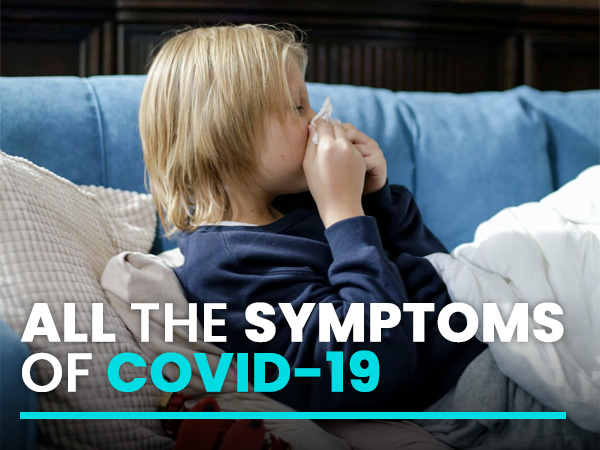
Several symptoms have been associated with this respiratory illness, with cough, fever, and shortness of breath being the most common signs. This article covers all the symptoms that have been associated with the coronavirus infection reported by patients, new ones added by CDC and the certain symptoms that can strike any time.
Doctors at a leading private facility in Delhi have found multiple cases in recovering coronavirus patients, who were diagnosed with a deadly fungal infection "triggered by COVID-19", due to which nearly half of them lost their eyesight, hospital authorities claimed on 14 Monday, December 2020.
The second wave of the COVID-19 pandemic has really hit the nation hard. Here are some of the recently reported COVID-19 symptoms:
- Loss of hearing
- Pink eye/conjunctivitis
- Bone-dry mouth and reduced secretion of saliva
- Severe and long-lasting headache
- Gastrointestinal tract infection
- Dry and itchy tongue
- Rare occurrence of ulcers
According to experts, certain symptoms have been specific to people of different age groups.
COVID-19 Symptoms In Babies
Cough, sore throat, runny nose, sneezing, fever, muscle pain, moodiness, trouble in sleeping, digestive problems, shortness of breath, mild pneumonia.
COVID-19 Symptoms In Kids
Fever, flu-like symptoms, respiratory tract infection, digestive symptoms, changes in the sense of smell, pain, behavioural changes.
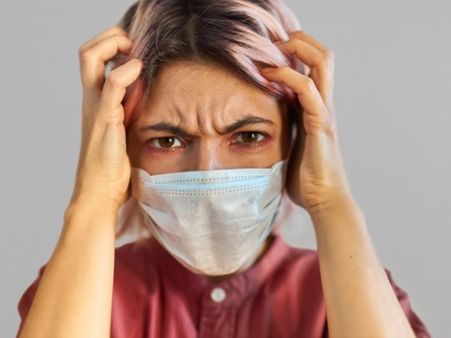
1) New COVID-19 Symptoms Added By CDC
As the pandemic continues to loom over our lives, scientists and health experts are exploring the short- and long-term health effects associated with the respiratory infection [1]. Many organs besides the lungs are affected by the virus and the 17 new symptoms added by CDC.
- Fatigue
- Shortness of breath
- Cough
- Joint pain
- Chest pain
- Difficulty with thinking and concentrating also called brain fog
- Depression
- Muscle pain
- Headache
- Intermittent fever
- Fast-beating heart also called heart palpitations
- Cardiovascular complications such as inflammation of the heart (muscle)
- Lung function abnormalities
- Acute kidney failure
- Dermatologic complications such as rashes and hair loss
- Neurological problems such as smell and taste problems, sleep issues, difficulty with concentration loss [3]
- Psychiatric complications such as depression, anxiety, and rapid changes in the mood [4]
The following are long-term complications that are severe in nature. However, these have been reported in fewer numbers in comparison to the short-term symptoms [2].

2) The COVID-19 Long Hauler Symptoms
These are the types of symptoms that are long-lasting and are still in need of further studies to understand the extent of their risk and the complications that can arise in one's body as the result.
- Diarrhoea
- Heart palpitations
- Joint pain
- Cough
- Persistent chest pain
- Dizziness
- Memory problems
- Anxiety
- Sleeping problems
- Severe headache
- Inability to be active or exercise
- Difficulty focusing
- Difficulty breathing (high-risk symptom)
- Muscle and body aches
- Fatigue (the most common long-lasting symptom reported) [5][6]

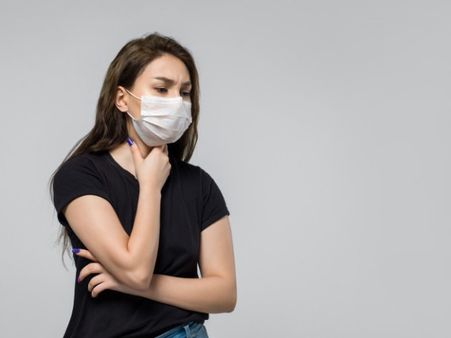
3) Symptoms Of Long COVID-19
These are the types of symptoms associated with Covid-19, which indicate that these are some symptoms that will not just ‘go away,' even when the person recovers from the respiratory illness [7].
- Fatigue
- Headache
- Difficulty breathing
- Hoarse voice
- Body aches

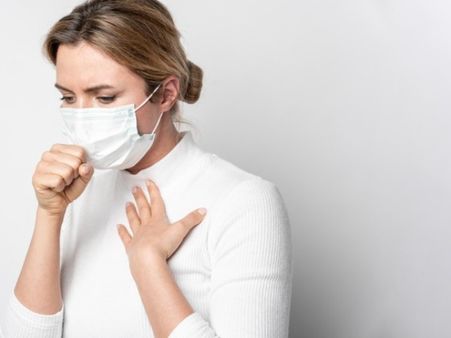
4) Sudden COVID-19 Symptoms That Can Strike Anytime
The unpredictability of Covid-19 symptoms adds to the anxiety and fear that looms concerning the illness that has shut down the world. Although every case is different, there are some sudden symptoms to be aware of, so you may keep an eye out for yourself and the ones around you [8][9].
- Hearing loss [10]
- Cardiac event
- Stroke
- Blood clots
- Fever [11]
- New and sudden loss of smell
- Loss of taste


5) Uncommon COVID-19 Symptoms
With more studies being carried out on better understanding the SARS-CoV-2, new findings are also reported. On analysing the symptoms reported around the globe, the following symptoms have been defined as being rare and long-lasting [12].
- Lung scarring
- Kidney failure
- Physical debilitation [13]
- Hypertension
- Persistent fatigue
- Venous insufficiency in the legs (permanent damage to leg veins) [14]
- Post-traumatic stress disorder (PTSD) that causes nightmares, flashbacks, anxiety, and depression due to the trauma caused by the disease [15]
- Limb numbness
- Requires oxygen support

6) Other COVID-19 Symptoms Reported
Surveys and studies have gathered a list of symptoms of Covid-19, reported across the globe and they are as follows:
- Syncope (fainting due to a temporary drop in blood flow to the brain) [16]
- Bilateral Neck Throbbing Around Lymph Nodes
- Elevated thyroid
- Anaemia
- Herpes, EBV, or Trigeminal neuralgia symptoms such as fatigue, inflamed throat, fever, and facial pain [17]
- GERD with excessive salivation
- Drastic personality change
- Thrush (small white lesions inside your mouth caused by an imbalance of bacterial growth)
- Hormonal imbalances
- Urinary tract infection
- Kidney issues or protein in the urine
- Dry scalp (dandruff)
- Low blood pressure
- Eye stye (infection)
- Foot and hand pain
- Goitre
- Dry and cracked lips
- Cold burning feeling in the lungs
- Low blood oxygen (turns your lips blue)
- Arrhythmia (problem with heart rhythm)
- Jaw pain
- Painful scalp
- Burning/fizzing sensation
- Bulging veins
- Costochondritis (inflammation of the cartilage that connects a rib to the breastbone) [17]
- Brain pressure
- A feeling of burning skin
- Phantom smells (phantosmia or olfactory hallucination) [18]
- Chills without fever
- Covid toes
- Heat intolerance and feeling too hot
- Post-nasal drip
- Weight loss/gain
- Tinnitus or humming in ears
- Constant thirst
- Floaters (flashes of light in vision)
- Upper/lower/rib cage pain
- Tremors
- Calf cramps
- Dry eyes
- Clogged ears
- Acid reflux/heartburn
- Hair loss
- Tachycardia (occurs when your heart beats over 100 beats per minute)
- Changing symptoms
- Night sweats
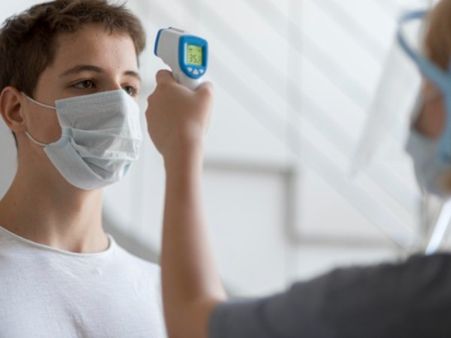
On A Final Note…
While most individuals with Covid-19 recover and return to normal health, some patients can have symptoms that can last for weeks or even months after recovery. Studies are being conducted to understand the symptoms of this respiratory illness.
-
 pregnancy parentingMysterious Pneumonia Outbreak In China: What Are The Long-Term Effects Of Pneumonia In Children?
pregnancy parentingMysterious Pneumonia Outbreak In China: What Are The Long-Term Effects Of Pneumonia In Children? -
 healthCan You Get Back COVID-Related Loss Of Sense Of Smell And Taste (Parosmia)? Looks Like You Can!
healthCan You Get Back COVID-Related Loss Of Sense Of Smell And Taste (Parosmia)? Looks Like You Can! -
 healthDid Covid-10 Vaccination Increase Risk Of Sudden Deaths In Young Adults? ICMR Finds This..
healthDid Covid-10 Vaccination Increase Risk Of Sudden Deaths In Young Adults? ICMR Finds This.. -
 wellnessDelhi Air Pollution, Air Quality Very Poor: Do Covid Masks Help Reduce Pollution Side Effects?
wellnessDelhi Air Pollution, Air Quality Very Poor: Do Covid Masks Help Reduce Pollution Side Effects? -
 healthNobel Prize 2023: Scientists Behind The COVID-19 mRNA Vaccines Wins
healthNobel Prize 2023: Scientists Behind The COVID-19 mRNA Vaccines Wins -
 healthWhat Is Disease X? 20 Times More Deadlier Than Covid 19; Can Cause 50 Million Deaths, Does It Have Vaccine?
healthWhat Is Disease X? 20 Times More Deadlier Than Covid 19; Can Cause 50 Million Deaths, Does It Have Vaccine? -
 healthCOVID-19 Vaccines and Heart Attacks: New Studies Show Different Results; What Are They?
healthCOVID-19 Vaccines and Heart Attacks: New Studies Show Different Results; What Are They? -
 healthDo You Pick Your Nose? Stop! It Can Increase COVID Risk
healthDo You Pick Your Nose? Stop! It Can Increase COVID Risk -
 healthEris Variant: WHO Alarms New Covid Wave; Should India Be Concerned About This Pandemic
healthEris Variant: WHO Alarms New Covid Wave; Should India Be Concerned About This Pandemic -
 healthVitamin D Deficiency Linked With Increased Risk Of Long COVID
healthVitamin D Deficiency Linked With Increased Risk Of Long COVID -
 healthCOVID Surge In India: Do You Need A COVID-19 Booster Shot?
healthCOVID Surge In India: Do You Need A COVID-19 Booster Shot? -
 healthCOVID-19: IMA Cites 3 Reasons Behind Recent Surge In Covid-19 Cases: What Are They?
healthCOVID-19: IMA Cites 3 Reasons Behind Recent Surge In Covid-19 Cases: What Are They?


 Click it and Unblock the Notifications
Click it and Unblock the Notifications




